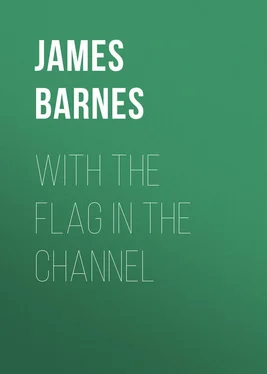James Barnes - With The Flag In The Channel
Здесь есть возможность читать онлайн «James Barnes - With The Flag In The Channel» — ознакомительный отрывок электронной книги совершенно бесплатно, а после прочтения отрывка купить полную версию. В некоторых случаях можно слушать аудио, скачать через торрент в формате fb2 и присутствует краткое содержание. Жанр: foreign_antique, foreign_prose, на английском языке. Описание произведения, (предисловие) а так же отзывы посетителей доступны на портале библиотеки ЛибКат.
- Название:With The Flag In The Channel
- Автор:
- Жанр:
- Год:неизвестен
- ISBN:нет данных
- Рейтинг книги:3 / 5. Голосов: 1
-
Избранное:Добавить в избранное
- Отзывы:
-
Ваша оценка:
- 60
- 1
- 2
- 3
- 4
- 5
With The Flag In The Channel: краткое содержание, описание и аннотация
Предлагаем к чтению аннотацию, описание, краткое содержание или предисловие (зависит от того, что написал сам автор книги «With The Flag In The Channel»). Если вы не нашли необходимую информацию о книге — напишите в комментариях, мы постараемся отыскать её.
With The Flag In The Channel — читать онлайн ознакомительный отрывок
Ниже представлен текст книги, разбитый по страницам. Система сохранения места последней прочитанной страницы, позволяет с удобством читать онлайн бесплатно книгу «With The Flag In The Channel», без необходимости каждый раз заново искать на чём Вы остановились. Поставьте закладку, и сможете в любой момент перейти на страницу, на которой закончили чтение.
Интервал:
Закладка:
“Now, men,” said Conyngham quietly, “we want no cutting, slashing, or shooting, and you’re our prisoners. But don’t be afraid,” he added, as he saw a look of fear come into the Englishmen’s eyes. “We are no pirates. You’ll get to Portsmouth all right, where you can join your ship. You’ll have a good joke to tell them of the Yankee-Irish trick that was played on you. Take the prisoners below, Mr. Corkin,” he continued, addressing the boatswain. “Put them in the hold and mount a guard over them. – And now, Socrates,” he added, turning to the grinning cook, “we’ll have our breakfast in the cabin.”
The English lieutenant, released from his bonds, sat at first in sulky silence and would not even touch a bit of the savory rasher that Socrates placed before him. When he went on deck later at Captain Conyngham’s invitation he looked off to the eastward. The Minerva, almost hull down, was holding a course toward the French coast. At the masthead of the Charming Peggy fluttered the English flag, and in the distance to the westward, plain above the horizon, rose the English shores.
“We’ll go in a little closer, Mr. Holden,” said Captain Conyngham, “and then we’ll part company, sir.”
He turned to the first mate.
“Mr. Jarvis,” he went on, “prepare to lower the cutter; put in a breaker of water, two bags of biscuit, and a bottle of port.”
After half an hour’s more sailing the brig was hove to and the crew, with Higgins and McCarthy now freed from their irons, pushed out from the brig’s side. In the stern sheets sat the lieutenant disconsolately.
He turned to watch the brig as she came about and headed off shore. At that moment down came the English flag and the Spanish took its place. And it was just at this minute that Captain Conyngham, looking aloft, spoke to his first mate.
“We’ll have a flag of our own soon,” he said, “and avast with this masquerading, say I.”
The crew, as if they had heard his words, suddenly burst into a spontaneous cheer. Their voices, carried by the wind, reached the Englishmen slowly pulling in for the distant headlands.
CHAPTER IV
IN HOLLAND AND FRANCE
For two months now Captain Conyngham and Jonathan Nesbit, a nephew of Mr. James Nesbit, of Philadelphia, had been in Holland purchasing supplies and outfitting the Peggy, after her safe arrival, for her return voyage to America. They found, however, that the difficulties were greater than they had imagined. Although the cargo had been placed on board, at least the greater part of it, so closely were the Dutch ports watched, and those of France also, that it was almost impossible for any American vessel to set sail for home without word being sent to the English cruisers hovering on the coast of the time for sailing, and many prizes had they taken within a few miles of the harbor mouth. The towns and seaports were full of spies. Both France and Holland were then at peace with England, and English vessels were leaving and entering almost every day, so the naval authorities were well informed of doings elsewhere. Another difficulty also had presented itself in that the stores which had been placed on board the Charming Peggy were evidently munitions of war, and the Dutch Government had been complained to by the English consul, and therefore the little brig was under a strict surveillance. If she had been a faster sailer Captain Conyngham would have taken advantage, on two or three occasions, of the thick and stormy weather that had prevailed. Once he had slipped his cable, but an English armed sloop near him had done the same and had followed him almost to the open water, where, seeing it was impossible to escape, Conyngham had turned and gone back to his anchorage.
So strong now were the remonstrances of the English representative, that the Dutch custom officials confiscated the Peggy, and she was brought into court. To save themselves a total loss, her cargo was resold at a great discount by Nesbit and Conyngham, and the Peggy herself was disposed of to a Dutch shipping house.
And now Captain Conyngham found himself stranded, like many another American shipmaster, on the shores of a foreign country. His active spirit chafed at the enforced idleness, but week after week passed, and he saw no chance of getting away. But great things had happened in America since his departure, and great things were soon to happen in Europe.
The Declaration of Independence had been signed and heralded to the world. A small fleet had been organized, and it was rumored that vessels of war were building in the home ports to go out and fight the English on the high seas. Stronger and stronger grew the ambition in Conyngham’s heart to get into active service. He grew almost despondent, however, as the time dragged on.
It was difficult even to obtain news, and the uncertainty of what was happening at home made his position more galling. At last one day the information was brought by post from Paris to The Hague that two American vessels of war – the Reprisal, commanded by a Captain Wickes, and a smaller vessel, the Lexington – had arrived in France; but, better news than all that, Dr. Benjamin Franklin had reached the capital itself armed with credentials from the American Congress to act as Minister Plenipotentiary and Extraordinary to the French court.
For a long time a plan had been in Captain Conyngham’s mind, the feasibility of which, granting that certain obstacles were removed, tempted him strongly. There were enough American sailormen, of good fighting stock, hanging idly about French and Dutch ports of entry, to man a small squadron. Why was it not possible to fit out one vessel at least and sail into the highway of British commerce? The risk would be great, the rewards would be tremendous, and the advantages to the American cause, if the project was successful, past reckoning. All it required was money and a starting place. It would be necessary, no doubt, from the very first to arrange matters with the immediate authorities in order to have them wink at the proceeding, and to do this, back of the whole idea, there must lurk that important word, authority.
Any ship’s captain who sailed on his own account and made prizes in the English Channel, would get no mercy if he once fell into the hands of the enemy. But even without the authority Captain Conyngham was eager to take the risk, if a vessel could be procured and he could find others to join him.
Shortly after the news reached him at The Hague of Franklin’s arrival, he left Holland and sailed as passenger in a Dutch coaster to Dunkirk, and there, the very night of his arrival, he met with a man who was to have a great influence in his further doings.
Messrs. Hodge, Allan, and Ross were three Americans, part factors, part merchants, who were in France at the time of the breaking out of war between America and the mother country.
In the earlier months before the English had begun their very strict watching of the foreign ports, they had managed to send out some small and miscellaneous cargoes of supplies. Latterly, however, they had been unsuccessful, but with the arrival of Franklin and the appointment as commissioners of Mr. Arthur Lee and Mr. Silas Deane, the latter a New England merchant well known to them, a better prospect seemed to dawn.
The Reprisal had brought in with her three English vessels, all merchantmen, the first prizes to be brought into the ports of a foreign country. The English ambassador, Lord Stormont, had raised a dreadful row at the French court over this proceeding, and it was rumored that the American vessels and their prizes would be forced to quit the French harbors.
It was just at this time that Conyngham landed at Dunkirk, having come down by sea from Holland in a Dutch packet. He had hardly set foot on French shore when he met a Mr. Thomas Ross, whom he had known as a supercargo on one of his earlier voyages into the Mediterranean. It was years since they had seen one another, but Mr. Ross remembered him at once.
Читать дальшеИнтервал:
Закладка:
Похожие книги на «With The Flag In The Channel»
Представляем Вашему вниманию похожие книги на «With The Flag In The Channel» списком для выбора. Мы отобрали схожую по названию и смыслу литературу в надежде предоставить читателям больше вариантов отыскать новые, интересные, ещё непрочитанные произведения.
Обсуждение, отзывы о книге «With The Flag In The Channel» и просто собственные мнения читателей. Оставьте ваши комментарии, напишите, что Вы думаете о произведении, его смысле или главных героях. Укажите что конкретно понравилось, а что нет, и почему Вы так считаете.












